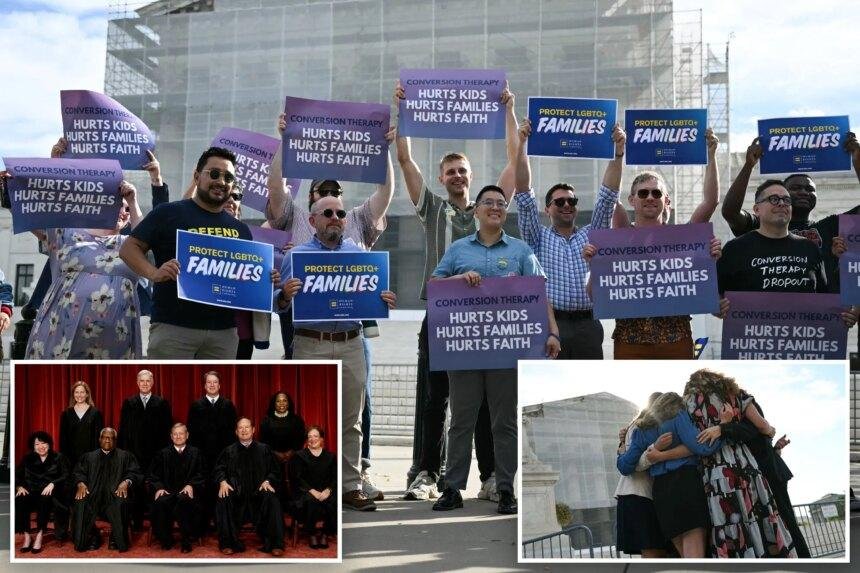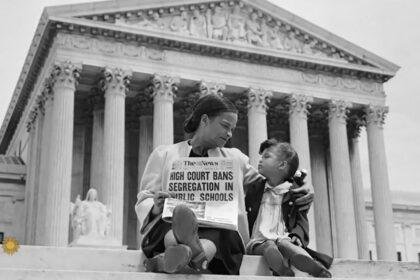Supreme Court Hears Challenge to Colorado’s Ban on Conversion Therapy for Minors
Washington, D.C. – The U.S. Supreme Court convened on Tuesday to deliberate a contentious case regarding Colorado’s 2019 law that prohibits licensed mental health professionals from conducting conversion therapy aimed at altering the sexual orientation or gender identity of minors. This case, Chiles v. Salazar, has drawn significant attention, reflecting broader societal debates over LGBTQ+ rights, free speech, and the role of government in regulating mental health practices.
Background on Conversion Therapy
Conversion therapy, often referred to as “reparative therapy,” has been widely discredited by major medical organizations, including the American Psychological Association and the American Medical Association. These organizations argue that such practices can lead to severe psychological harm, including depression and anxiety. In response to these concerns, nearly half of U.S. states have enacted laws similar to Colorado’s, which aim to protect minors from potentially harmful therapeutic practices.
The Colorado law specifically prohibits any treatment that “attempts or purports to change an individual’s sexual orientation or gender identity.” This legislative move aligns with a growing recognition of the need to safeguard vulnerable populations from practices deemed unethical and harmful.
The Court’s Divided Opinions
During the oral arguments, the justices exhibited a clear divide along ideological lines. Conservative justices expressed skepticism regarding the constitutionality of the Colorado law, while their liberal counterparts appeared more supportive of the state’s position. Chief Justice John Roberts raised concerns about the implications of restricting therapists’ speech, suggesting that the law might infringe upon First Amendment rights. “Just because they are engaged in conduct,” he stated, “doesn’t mean their words aren’t protected.”
Conversely, Justice Sonia Sotomayor highlighted the unusual nature of the case, noting that the law had seen no enforcement for six years-three years prior to the lawsuit and three years since. This lack of enforcement raises questions about the law’s practical implications and the motivations behind the challenge.
Arguments Presented
Kaley Chiles, a Christian therapist challenging the law, argues that the ban infringes upon her free speech rights. Her attorney, James Campbell, emphasized the distinction between voluntary talk therapy and more invasive medical procedures, asserting that the law effectively censors conversations surrounding moral, religious, and scientific beliefs. “This law prophylactically bans voluntary conversations,” Campbell argued, “censoring widely held views on debated moral, religious and scientific questions.”
In contrast, Colorado Solicitor General Shannon Stevenson defended the law, asserting that medical professionals have a responsibility to provide ethical care. She argued that the state has a vested interest in regulating practices that could harm minors. “This has been an area that has been heavily regulated from the beginning of our country,” Stevenson stated, emphasizing that no one has ever suggested that a doctor has a First Amendment defense to provide harmful advice.
Historical Context and Evolving Standards
The debate over conversion therapy is not merely a contemporary issue; it is rooted in a long history of medical and societal attitudes toward homosexuality. In the 1970s, homosexuality was classified as a mental disorder, a view that has since been discredited. Justice Neil Gorsuch pointed out this historical context, questioning whether the legal framework supporting Colorado’s ban could have similarly justified prohibiting affirming talk therapy in the past.
Justice Samuel Alito raised concerns about the politicization of medical consensus, asking whether there have been instances where medical professionals have been influenced by ideology rather than science. This line of questioning underscores the complexities involved in determining what constitutes acceptable medical practice.
The Role of Free Speech
The justices grappled with the intersection of free speech and professional conduct. Liberal Justice Ketanji Brown Jackson expressed confusion over how a therapist’s professional actions could be considered First Amendment expression. This highlights a critical tension in the case: the balance between protecting minors from potentially harmful practices and safeguarding the rights of professionals to express their beliefs.
Justice Elena Kagan further illustrated this tension by posing a hypothetical scenario in which two doctors offer conflicting advice to a patient regarding their sexual orientation. She questioned whether the differential treatment of these two perspectives could be seen as viewpoint discrimination, a concept that could have significant implications for the case’s outcome.
Potential Outcomes and Implications
As the Supreme Court deliberates, the implications of its decision could extend far beyond Colorado. A ruling in favor of Chiles could set a precedent that undermines similar laws across the country, potentially opening the door for the resurgence of conversion therapy practices. Conversely, a ruling upholding the Colorado law would reinforce the growing consensus against conversion therapy and affirm the state’s role in protecting minors from harmful practices.
The case has already been upheld by multiple lower courts, including the Denver-based 10th Circuit Court of Appeals, which found that the law serves a legitimate state interest in protecting the mental health of minors.
Conclusion
The Supreme Court’s examination of Chiles v. Salazar encapsulates a broader societal struggle over the rights of LGBTQ+ individuals, the responsibilities of mental health professionals, and the limits of free speech. As the justices weigh the arguments, the outcome will likely resonate across the nation, influencing not only the legal landscape surrounding conversion therapy but also the ongoing discourse about LGBTQ+ rights and protections. The decision, expected in the coming months, will be closely watched by advocates on both sides of the issue, as it could have lasting implications for the future of mental health care and civil rights in America.











